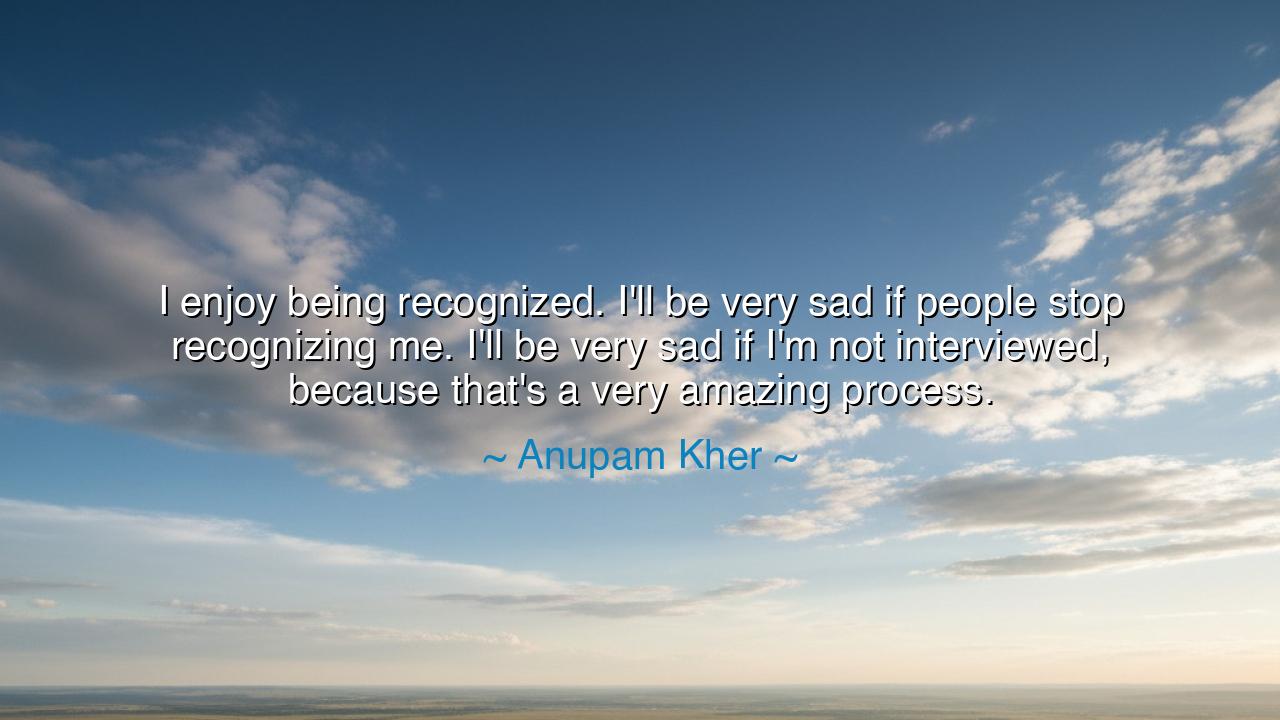
I enjoy being recognized. I'll be very sad if people stop
I enjoy being recognized. I'll be very sad if people stop recognizing me. I'll be very sad if I'm not interviewed, because that's a very amazing process.






Anupam Kher once spoke with disarming honesty and human warmth: “I enjoy being recognized. I'll be very sad if people stop recognizing me. I'll be very sad if I'm not interviewed, because that's a very amazing process.” In these words, we glimpse not vanity, but vulnerability—the quiet confession of a soul that has lived in the light and knows the ache of its possible fading. For to be recognized is not merely to be seen, but to be remembered; it is to feel that one’s voice still echoes in the hearts of others. And when that echo grows faint, it is not only fame that fades, but a part of the self that once found purpose through connection.
The ancients understood this longing deeply. In the amphitheaters of Greece, actors wore masks that magnified their expressions, not to hide, but to make themselves visible to every seat in the house. They knew that to be seen was to exist fully in the shared consciousness of the people. When Kher speaks of recognition, he speaks the same truth that lived in the hearts of those who sought glory, art, or remembrance throughout history—the yearning to matter, to leave an imprint on the minds of men. It is a yearning that binds artist and audience, speaker and listener, life and legacy.
Consider the tale of Achilles, who was offered two fates: a long life of obscurity or a short one of eternal renown. He chose the latter, saying that to be forgotten is a fate worse than death. And so, though his body perished, his name endures in story and song. Kher’s words, though gentler, arise from the same source: the understanding that recognition—whether through art, words, or the gaze of others—is a kind of immortality. The interview, as he calls it, is not merely a ritual of publicity; it is an act of remembrance, a conversation that keeps the flame of one’s existence alive in the world’s memory.
Yet there is humility beneath his declaration. He does not demand recognition as a tyrant demands tribute; rather, he admits that without it, he would feel sad—not empty of pride, but of purpose. For those who create, the world’s acknowledgment is not vanity—it is validation that their creation has reached another soul. To be unseen after a lifetime of being seen is to feel like a candle still burning in an empty hall. The sadness he speaks of is the sadness of the sunset—beautiful, inevitable, yet aching with remembrance of its own light.
History shows us that even the greatest grow weary of obscurity. Michelangelo, in his later years, wrote letters lamenting that his works might one day be forgotten or misattributed. The poet Horace, centuries before him, declared proudly, “I have built a monument more lasting than bronze.” These were not boasts of ego, but prayers for endurance. The artist, the thinker, the teacher—all seek to leave behind some part of their essence. Kher’s enjoyment of recognition is part of that eternal human desire—to be known, not for power or wealth, but for having shared one’s spirit with the world.
The deeper teaching in his words is this: recognition, though fleeting, reminds us that life is not lived in isolation. We are made for relationship, reflection, and exchange. When someone looks at us and remembers our work, our words, our presence—they affirm that we have not lived in vain. But the wise among us must also learn to balance recognition with inner peace, to remember that even when the world forgets, the worth of one’s life does not vanish. The applause fades, but the act of creation remains eternal.
Therefore, let this truth be passed to future generations: do not be ashamed of wanting to be recognized. To desire acknowledgment is to desire communion—to be part of the living dialogue of humanity. Yet, when the lights dim and the stage grows quiet, do not despair. The true measure of worth lies not only in being remembered by others, but in remembering yourself—your effort, your craft, your truth. Recognition is a gift; purpose is a choice. Cherish both, but let neither enslave you.
For one day, when the interviews end and the crowds disperse, the wise will still smile—not because the world is watching, but because they know they have given their best song to the wind. And even if the world forgets the singer, the music of the soul will remain, vibrating softly in eternity.






AAdministratorAdministrator
Welcome, honored guests. Please leave a comment, we will respond soon